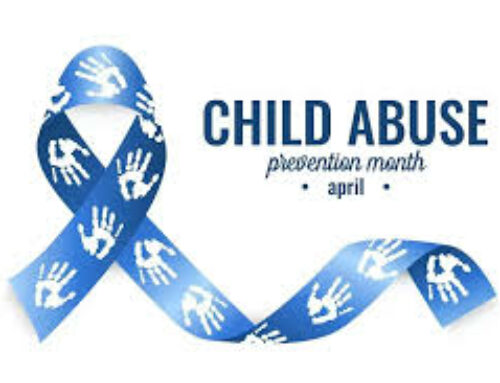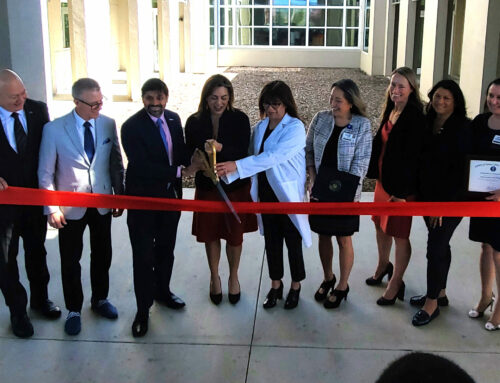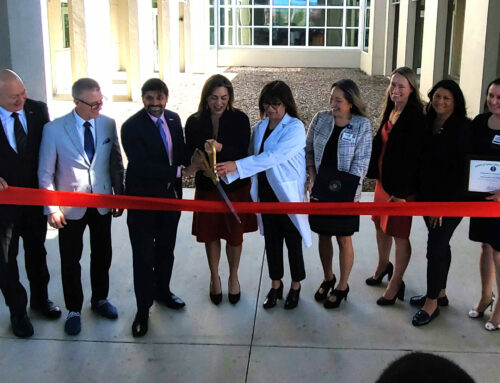Early onset Alzheimer’s causes short-term memory loss, problems with motor skills
Published in the March 15 – 28, 2017 issue of Morgan Hill Life
By Marty Cheek

Photo courtesy the Perez family
Jim and Christine Perez on their wedding day.
A woman with a lively personality, Christine Perez worked for years in the marketing department at Hewlett Packard. When she was 43, doctors diagnosed the Morgan Hill resident with early onset Alzheimer’s. She died in September 2012 at the age of 50.
Jim Perez, Christine’s husband of almost 30 years, noticed the signs of dementia several years before the diagnosis. The first hint was when he saw canceled checks returned by the bank. Christine had asked supermarket clerks to fill the amount boxes. Besides short-term memory challenges, the disease caused problems with his wife’s motor skills, which made it a problem for her to write anything more complicated than her signature. She also got confused by how to write in an amount on the check.
The progression of symptoms of dementia caused by the brain disease started to strain the quality of life of Christine and Jim’s family. Son Ryan was 10 and son Martin was 12 when their mother was diagnosed.
“At first, I really didn’t know how to explain to my sons what was happening to their mother,” Jim said. “I tried to keep things as normal as I could for them but it was very difficult. My personal life became 24-hour care for my wife. My job was a good distraction, but it seemed that the dementia was always on my mind.”
Another problem is that the personality of the loved one with the disease changes severely, and they will often grow suspicious of other family members.
“It was pretty tough because sometimes people with dementia will focus on a person, and at the time it ended up being my younger son,” Jim said.
Christine would accuse Ryan of lying and taking objects and blame him for different things she thought were happening. Jim had to protect the boy from his mother’s unusual behavior.
“I did it by trying to explain the best I could that she was sick,” he said. “Then I would try not to let him get into that situation and try to distract her if she looked like she was going to be agitated.”
Jim’s life soon revolved around taking care of his wife. He set up a hospital bed in the family room because the bedrooms were upstairs in their home. This allowed Christine to be more involved with her family and see her children more. During the last five years of her life Christine could not walk and her speech was limited. As her physical condition grew worse, Jim hired a home-care woman during the day when he was at work. Fortunately, his wife in her 30s had signed up through HP for long-term disability insurance which was offered at $30 a month.
“That ended up paying for the home-care lady,” he said. “It adds up pretty quick when you pay by the hour.”
Alzheimer’s is a very isolating disease for caregivers. A big help for him emotionally was getting involved with a dementia support group in Morgan Hill, Jim said.
“Even though I was already well into the disease with my wife, it helps to listen to others going through the same thing,” he said. “A lot of time your experiences are pretty similar and you learn tricks here and there and care and communication and things like that. Also, in the beginning, it’s just overwhelming. You’re lost, you’re really lost. And people who came into the support group in the beginning did not know what to expect, so it helps with the unknown because you really don’t know what’s going to happen from month to month or day to day, too.”
Jim also advises people giving care to people facing dementia symptoms should take care of their own physical health.
“It’s difficult to care for a loved one if you aren’t at your best,” he said. “Also, it sounds easy, but try to improve your outlook. When things seem at their worst, remember, it’s not your loved one’s fault and it’s not your fault.”
When it comes to dealing with dementia, everyone’s situation is different. The Perez family had relatives in Morgan Hill who helped out with meals and chores. Friends came by and offered care-giving assistance when Jim needed to get away for a while.
“At the time in the neighborhood I live in, I was lucky to be surrounded by great people,” he said. “They were all aware of our situation, and their help and support was appreciated more than they knew. My mom was retired and along with other family members, was always there for us. Caring for my wife at home would not have been possible without these awesome people.”






